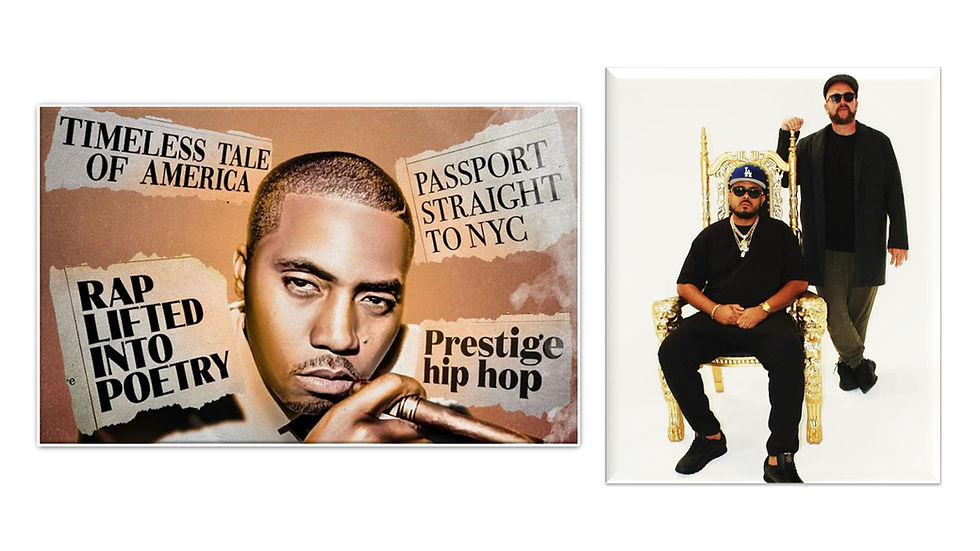The Influence of Black Music
- Aug 25, 2017
- 3 min read

On Aug. 24th, I came across a music documentary called “Bad Rap” on Netflix, and it’s about young Asian-American rappers striving for success in the entertainment world of Hip-Hop music.
The documentary started detailing that Hip-Hop music is an art form from the black community, and it was difficult for other minority groups such as Hispanic-Americans and Asian-Americans to break through the mainstream and be taken seriously as a respectable artist and MC.
“It’s hard for a lot of Latino rappers to cross over. Again, if you’re talking stereotypes, they have the stereotype of machismo, that would follow them around, but that is a hyper-masculinity. Yet you don’t see a ton of Puerto Rican or Dominican rappers out there. You could ask why it is that you don’t see more successful South Asian-American rappers for example,” Journalist and Sociology Professor Oliver Wang said. “South Asians I feel don’t have that same sort of questionings of masculinity. African-American men have that association in terms of they’re considered to be the most racially authentic performers. Anyone who doesn’t fit into that particular box, becomes more in a sense, suspicious for an audience member.”
In the early 80s, the Filipino community, especially on the west coast had a tremendous effect on Asian-American participation in Hip-Hop Music. When the Los Angeles Hip-Hop movement began on the west coast in its original stage, artists like Rodney-O and Joe Cooley, Easy-E, NWA, Ice-T and others like Snoop Dogg, Too Short, The Pharcyde and King T gained traction when music videos became popular on MTV in the early 1990s.
It was interesting to find out there was a Chinese-American Hip-Hop group called “Mountain Brothers,” and they won a contest sponsored by Sprite in 1999. Sprite asked inspiring rappers to participate by sending in a tape about them rhyming about their product. The Mountain Brothers ended up winning the contest, and no one at the Sprite corporation realized that they were Chinese-American.
After the success of the commercial, the group signed to Ruffhouse Records, who previously signed Hip-Hop Acts The Fugees and Cypress Hill. At the time, Ruffhouse Records became a major player in the world of Hip-Hop in the 1990s.
It’s no secret that throughout the years in the U.S., black music has been exploited for personal gain by other artists. For example, the originator and king of Rock ‘n’ Roll Chuck Berry was imitated by none other than Elvis Presley in the 1950s, but Presley still got the credit and accolades for being the true king of Rock ‘n’ Roll in the U.S.
“If you look at the history of black culture, in the U.S., it’s a culture of consistent cycles of exploitation and appropriation. I think that because of that troubling history, it’s perfectly understandable why one would have a concern around something like Hip-Hop, which has proven to be incredibly lucrative,” Wang said.
The audience is taken on an in-depth journey about the careers of Asian-American rappers, and they are Awkwafina, Rekstizzy, Lyricks, Dumbfoundead and much more.
The documentary also talked about Asian stereotypes on TV, which consisted of Asian men never getting the beautiful girls, they get made fun of, they are good at karate and at math. The Asian-American rappers also said there is more to Asian-American people than the stereotypes that are portrayed by the media.
The rappers talked about what they have been through while following their dreams. They all shared that they weren’t respected because of the way they looked, and this was before given the chance to show off their skills on the microphone. Once they became successful after being consistent over many years, they gained the respect from their fans and followers.
“I started rapping because I feel like I had a message, I feel like I had to express myself.” – Lyricks
To check out the trailer for “Bad Rap,” click here: https://www.youtube.com/watch?v=dNjbnQmb6vE
* On Aug. 23rd, my doctor’s appointment with Hanger Prosthetics and Orthotics got cancelled because one of the parts for my new prosthetic leg didn’t arrive in the office. My next appointment is Aug. 30th, and I hope I get a chance to walk in my new prosthetic leg.
Disclaimer…
I don’t own any content from the documentary “Bad Rap.” No Copyright Right Intended. All Rights go to Salima Koroma, Jaeki Cho.
Bad Rap Official Trailer 1 (2016) - Jonathan Park, Richard Lee Documentary HD courtesy of Movieclips Film Festivals and Indie Films from YouTube.com.
FilmFestivalVideos. “YouTube.” YouTube, YouTube, 11 Apr. 2016, www.youtube.com/watch?v=dNjbnQmb6vE. Accessed 24 Aug. 2017. https://www.youtube.com/watch?v=dNjbnQmb6vE
Koroma, S. director. Perf. Awkwafina, Rekstizzy, Lyricks, Dumbfoundead. Bad Rap. Netflix. 2016.
The Microscopic Giant. “Bad Rap” Asian American Rappers’ Documentary. Bad Rap Doc Artist Banner. August 25, 2017. http://themicrogiant.com/bad-rap-asian-american-rappers-documentary-indiegogo/




Comments